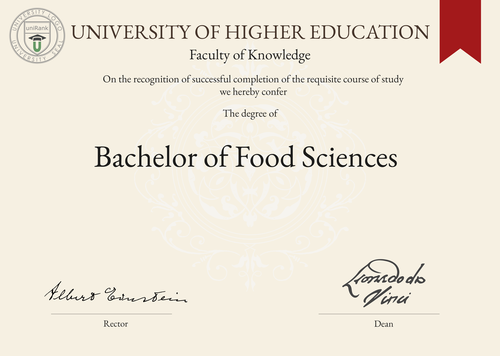
Bachelor of Food Sciences (BFS)
Guide to Bachelor of Food Sciences Program/Course/Degree
Bachelor of Food Sciences (BFS)

Program Name:
Bachelor of Food SciencesProgram or Degree abbreviation:
BFSDuration range:
The duration of the program typically ranges from 3 to 4 years.Tuition range:
The tuition fees for the program can vary depending on the country and university chosen. It is recommended to check with specific institutions for accurate information.Overview:
The Bachelor of Food Sciences program provides students with a comprehensive understanding of the science behind food production, processing and safety. It covers various aspects such as food chemistry, microbiology, nutrition, quality control and food engineering.Curriculum Overview by year:
- Year 1: Introduction to Food Sciences, Chemistry Basics, Microbiology Fundamentals - Year 2: Food Processing Techniques, Food Analysis, Food Safety and Quality Assurance - Year 3: Food Engineering, Food Product Development, Food Preservation Methods - Year 4: Advanced Food Chemistry, Food Packaging, Internship or Research ProjectKey Components:
The key components of the program include theoretical knowledge, practical skills, laboratory work, research projects and industry internships. Students gain hands-on experience in food processing techniques, quality control and product development.Career Prospects:
Graduates of the Bachelor of Food Sciences program can pursue various career paths in the food industry. They can work in food production companies, research and development organizations, quality control laboratories, government agencies and food regulatory bodies. Possible job roles include food technologist, quality assurance manager, product development scientist, food safety inspector and nutrition consultant.Salary Expectations:
The salary expectations for graduates of the Bachelor of Food Sciences program can vary depending on factors such as job role, experience, location and industry. Entry-level positions may have a salary range of $40,000 to $60,000 per year, while experienced professionals can earn higher salaries. For a more accurate understanding of salary expectations, you can utilize the Job Sites Search Engine, from our sister site jobRank, which searches over 4,600 job sites worldwide. Make sure to specify not only the job title but also the country you are interested in.Conclusions:
It is important to note that the duration, tuition fees, curriculum, key components, career prospects and salary expectations of the Bachelor of Food Sciences program can vary. These variations can be influenced by the chosen country or location for studying the program, as well as the specific university offering the program. Prospective students are advised to research and compare different universities and countries to find the best fit for their educational and career goals. Furthermore, visitors interested in pursuing a Bachelor of Food Sciences degree can utilize the uniRank World Universities Search Engine to search for institutions offering this specific degree worldwide. This search engine provides a comprehensive database of universities and their programs, allowing individuals to explore their options and make informed decisions about their education.World Universities Search Engine
search for Bachelor of Food Sciences (BFS) and add the Location (country, state etc.) or specific University you are interested in studying at.
Query examples:
- Bachelor of Food Sciences (BFS) United States
- Bachelor of Food Sciences (BFS) United Kingdom online
- Bachelor of Food Sciences (BFS) Australia international students
- Bachelor of Food Sciences (BFS) University of California
- Bachelor of Food Sciences (BFS) University of London tuition fees
- Bachelor of Food Sciences (BFS) University of Sydney scholarships
Share Program/Course
Interesting? Share this program/course/degree info with your friends now.